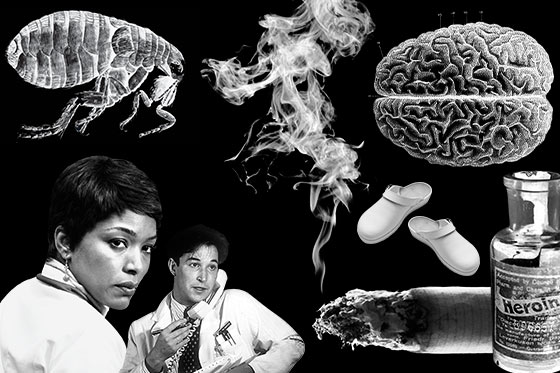
… Harvard Medical School class without women was in 1944. Owing to fears of a shortage of doctors, the ban was lifted during the war.
… Samples of smallpox virus—officially eradicated from the planet in 1980—are kept in freezers at the Centers for Disease Control in Atlanta and at a Russian lab in Siberia.
… Episode of ER aired on April 2, 2009.
… Flavored cigarettes in the U.S. (candy, fruit, or clove) were sold in 2009. Menthol is still legal, though.
… Outbreak of Ebola virus was in Guinea in March 2014.
… Patients with bubonic plague in New York were Lucinda Marker and John Tull, a couple, in November 2002.
… Abortion clinic in the Rio Grande Valley closed in March 2014. No legal abortion is available today in the poorest part of Texas.
… Time white nurse clogs hit mainstream fashion was in spring 2001.
… Pint of donor blood that wasn’t tested for HIV was collected in 1985.
… Use of mercury in medical equipment—it’s still found in some thermometers and other devices—is coming, via the World Health Organization’s Mercury-Free Healthcare by 2020 initiative.
… Legal heroin was sold in 1924, after which it was prohibited by the federal Heroin Act.
… Time the Magic School Bus entered the human body, on the PBS educational series of the same name, was on November 8, 1997, when it ventured into Arnold’s cousin Janet’s nose.
… Lobotomy in the U.S. was in 1967. (It ended the patient’s life.)
… Unlicensed doctors to practice medicine legally in the U.S. were in West Virginia, early in the 20th century. An 1881 law (upheld in Dent v. West Virginia) established the right of state medical boards to stop them, though oldsters were grandfathered in for decades thereafter.
… Naturally occurring cases of polio in the United States appeared in 1979. (In 2009, one adult patient with a compromised immune system developed polio and died after exposure to a vaccine.)
Research by Claire McCartney and Trupti Rami